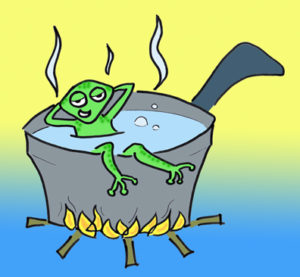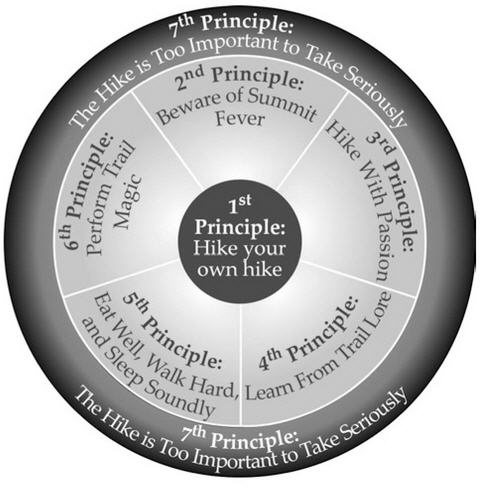 I just finished reading Francis Tapon’s first book Hike Your Own Hike, though it’s the second I have read of his travel adventures, the first being The Hidden Europe. (check out our review here).
I just finished reading Francis Tapon’s first book Hike Your Own Hike, though it’s the second I have read of his travel adventures, the first being The Hidden Europe. (check out our review here).
In typical Tapon style, he challenges popular beliefs, and encourages people to rise to their full potential by stepping out of their comfort zone. While the book is nothing like The Hidden Europe, which focuses on a historical account of the region and cultural adventures he experiences along the way, Hike Your Own Hike, like his second book, echoes one of his life pitches: get out there, explore the world and live on less. Other important aspects are also covered like gratitude, learning to embrace challenges rather than having them sink us, pacing ourselves so we appreciate and be present with whatever we’re dished, whether that’s on a three or four month hike along the Appalachian Trail (AT) or in your day-to-day life.
Of course the book offers practical advice on how to succeed on the trail, including a packing list, what to eat, how to pace yourself, the importance of water, rest and getting an early start among other things, the story is an analogy for life. What we face on the trail are often the same kinds of things we face in life, albeit without squirrels, rain storms, snakes and rock boulders to climb over. He explains the difference between day hikers one might meet along the AT (they often have heavier bags) versus what AT hikers call “thru-hikers”, the ones who make it all the way from Maine to Georgia (called Sobo’s: hikers who hike south) OR all the way from Georgia to Maine (called Nobo’s: hikers who go south to north).
The journey is a long one and not easy despite how long you take to do it. From Springer Mountain in Georgia, the trail extends 2,168 miles all the way to Mount Katahdin in Maine.
He asks his readers if they are suffering from Frog Psychology in Chapter 1. In other words, are you in a situation that is bad, yet doing nothing about it? When you don’t act, things often get progressively worse and continue to decline. Before you know it, you’re dead. He says, “get out of the boiling water now,” and make a positive change in your life. 
By suggesting that we create an “inflection point,” we can get a better handle on the situation and make a change that will improve our health and our lives. Most don’t take action because like the frog in a steadily warming pot, they suffer from inertia. He refers to Isaac Newton who described inertia this way: matter stays at rest of continues going in the direction it was traveling unless another force is applied.
In other words kids: get over it and move on.
“Any fool can criticize, condemn and complain — and most fools do.” — Dale Carnegie.
His chapters cover the lessons he learned on the trail and how they can be applied to every day life. It’s well thought out.
Hike Your Own Hike: Everyone has their own way of hiking the AT and hiking through life
Beware of Summit Fever: Don’t rush things, and be prepared so you’re not exposed when a life or financial storm hits you
Hike with Passion: Live Your Life with Passion – if you’re going to play, why not play full out? It’s the best way to get the most out of life, rather than driving with a half empty tank of gas.
Learn From Trail Lore: Wisdom: Learn from others who have insights that can save you time, effort and money
Eat Well, Walk Hard and Sleep Soundly: It’s about endurance but also about the importance of self care, eating healthy, getting balance in your life which includes sleep, meditation and reducing your stress
Perform Trail Magic: What goes around comes around and isn’t it true that you feel better when you give and contribute rather than take from this life? I love this one – it really shows that when we trust in the universe, it does indeed provide what we need and that people are inherently good and will help us on our journey when we’re following our destined path
The Hike is too Important to Take Seriously: Hear hear….if this isn’t a great metaphor for life. His point here is the most important life lesson. We decide how we will experience a situation, bad or good, by simply deciding. He talks about the importance of language as well! If you tell yourself you are strong and powerful and will ‘ace’ your journey, then chances are you will. We can choose to make an experience bad or good, so why not choose good?
“Too many people are thinking of security instead of opportunity; they seem more afraid of life than of death.” – James F. Byrnes

Renee Blodgett is the founder of We Blog the World. The site combines the magic of an online culture and travel magazine with a global blog network and has contributors from every continent in the world. Having lived in 10 countries and explored over 90, she is an avid traveler, and a lover, observer and participant in cultural diversity. She is also the founder of the Magdalene Collection, a jewelry line dedicated to women’s unsung voices and stories, and the award-winning author of the bestselling book Magdalene’s Journey
She is founder of Blue Soul Media and co-founder of Blue Soul Earth as well as the producer and host of the award-winning Blue Soul CHATS podcast, that bridges science, technology and spirituality. Renee also founded Magic Sauce Media, a new media services consultancy focused on viral marketing, social media, branding, events and PR. For over 20 years, she has helped companies from 12 countries get traction in the market. Known for her global and organic approach to product and corporate launches, Renee practices what she pitches and as an active user of social media, she helps clients navigate digital waters from around the world. Renee has been blogging for over 16 years and regularly writes on her personal blog Down the Avenue, Huffington Post, BlogHer, We Blog the World and other sites. She was ranked #12 Social Media Influencer by Forbes Magazine and is listed as a new media influencer and game changer on various sites and books on the new media revolution. In 2013, she was listed as the 6th most influential woman in social media by Forbes Magazine on a Top 20 List.
Her passion for art, storytelling and photography led to the launch of Magic Sauce Photography, which is a visual extension of her writing, the result of which has led to producing six photo books: Galapagos Islands, London, South Africa, Rome, Urbanization and Ecuador.
Renee is also the co-founder of Traveling Geeks, an initiative that brings entrepreneurs, thought leaders, bloggers, creators, curators and influencers to other countries to share and learn from peers, governments, corporations, and the general public in order to educate, share, evaluate, and promote innovative technologies.









